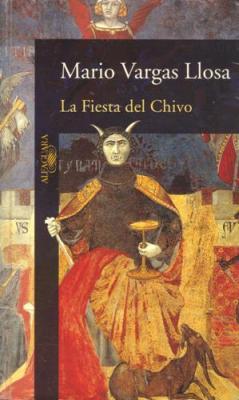In 1961 during the last days of the Dominican Republic’s
Trujillo regime, Urania Cabral, the teenaged daughter of a disgraced loyalist
politician, fled for the United States. Now a middle-aged woman, she has
returned to the island to confront her invalid father, her family, and the
island’s dark and tumultuous past.
Anyone who has read Junot Diaz’s work will be familiar with
the long shadow that Rafael Trujillo cast over the Dominican Republic for three
decades. Mario Vargas Llosa’s historical novel goes one step further, examining
Trujillo and all that he stood for through the eyes of a naïve girl turned
hardened woman, the various conspirators to his assassination (each with a
personal reason for wanting to see him dead), and the Goat himself. These
shifts in perspective, coupled with graphic depictions of depravity and
torture, make The Feast of the Goat a
difficult book albeit a rewarding one.
A large part of the novel’s allure is Llosa’s deft
combination of fact and fiction. Urania, her father, and several other
supporting characters are fictional, but Trujillo, his playboy son Ramfis, his
sadistic intelligence chief Johnny Abbes, and the Machiavellian civilian
president Joaquin Balaguer were all real historical figures. By taking us
inside their heads, Llosa simultaneously humanizes them and makes them more
monstrous. Trujillo, for instance, is depicted as a malcontent who has carried
the country on his back for thirty years by force of will. He sees himself as
surrounded by hordes of incompetent yes-men even though he himself is responsible
for their rise to prominence. Contrastingly, the men who carried out his assassination
(several of whom were military officers) had more or less come to accept
Trujillo’s autocratic rule as a way of life until a personal tragedy – the death
of a brother, being forced to forsake one’s love, etc. – pushed them over the
edge. It’s a morally ambiguous account that goes the distance to show that
blood is on everyone’s hands.
In contrast to the historical intrigue, the frame story seems
ponderous at times. It isn’t that Urania is a weak character – learning why she
loathes her father so much is one of the book’s central mysteries – it’s that
her role as expositor means she does nothing more than reproach and reminisce.
This lack of agency makes it hard to accept her as a protagonist even though
the novel positions here as such.
Stylistically, Llosa demonstrates incredible precision.
Everything from the cut of Trujillo’s suits to the methods used to torture the
conspirators is described in impeccable detail. Though vivid, there is a
certain stuffiness to the prose; however, this may be the result of the
translation.
By the conventions of the novel, The Feast of the Goat does not carry much forward momentum. But if
you look beyond its time-fractured narrative, it’s an engrossing look at
desperation, power, and corruption.
8.25/10

No comments:
Post a Comment